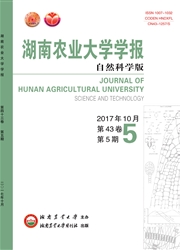

 中文摘要:
中文摘要:
测定了薇甘菊提取液对鬼针草种子萌发和幼苗生长的化感影响。结果表明,薇甘菊提取液处理,非入侵地鬼针草种子萌发率为52%,入侵地鬼针草种子萌发率为60%,薇甘菊对非入侵地鬼针草种子萌发的化感影响大于对入侵地鬼针草种子萌发的化感影响;薇甘菊对鬼针草幼苗总叶面积、最大量子产额和冠重没有明显的抑制作用;非入侵地处理与对照鬼针草幼苗的根重分别为23.50g和36.92g,入侵地处理与对照鬼针草幼苗的根重分别为22.19g和16.53g,薇甘菊对非入侵地鬼针草幼苗的根重的影响大于对入侵地的;入侵地鬼针草种子及幼苗对薇甘菊具有一定的化感抗性。
 英文摘要:
英文摘要:
In this work, the allelopathic effects of invasive Mikania micrantha on seed germination and seedling growth of Bidens pilosa was assessed. The results showed that after treated with extracted fluid from M. micrantha, the germination percentage of B. pilosa is 52% in non-invaded habitats, but the germination percentage of B. pilosa is 60% in invaded habitats which showing that the allelopathic effects of M. micrantha on seed germination of B. pilosa in non-invaded habitats was greater than those in the invaded habitats. M. micrantha showed no significant suppression effect on total leaf area, maximum quantum yield and shoot weight of the seedlings of B. pilosa. The root weight of B. pilosa seedlings from non-invaded habitats treated with M. micrantha and the control habitats was 23.50 g and 36.92 g respectively which was 22.19 g and 16.53 g with B. pilosa seedlings respectively from invaded habitats treated with M. micrantha and the control habitats, which showed that the effect of M, micrantha on root weight of B. pilosa seedlings in non-invaded habitats was greater than that in invaded habitats. The result indicated that both the seeds and the seedlings of B. pilosa in invaded habitats had developed allelopathic-resistance to M. micrantha.
 同期刊论文项目
同期刊论文项目
 同项目期刊论文
同项目期刊论文
 期刊信息
期刊信息
